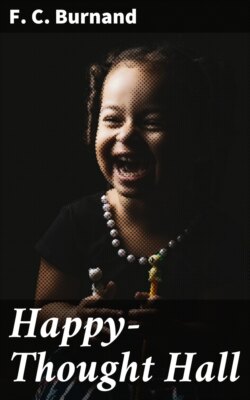Читать книгу Happy-Thought Hall - F. C. Burnand - Страница 5
На сайте Литреса книга снята с продажи.
CHAPTER II.
ОглавлениеTable of Contents
NOTIONS—GUIDE WANTED—BLACKMEER—CHILVERN—HIS ELEMENT—VIEWS—OBSERVATIONS—DISCUSSIONS—FISHING—TROUT—SHROPSHIRE—THE LAKE—THE SOLITARY CASTLE—HERMITS—GAMES—DIFFERENCES—AT THE HOUSE.
e go down. Hertfordshire. I find on inquiry that there is no Guide to this county. Black ignores it, Murray knows nothing about it, and Bradshaw is silent on the subject.
Happy Thought.—While at Our Mansion write a Guide to Hertfordshire.
Arrived at the station we inquire for Blackmeer Hall. Six or seven miles to drive. I ask if this distance isn't against it? I am met by the unanimous answer, “Not at all.”
Chilvern points out the beauties of the road as we go along. We become silent, not liking to have things perpetually pushed under our notice, as if we couldn't see them for ourselves.
“There's a fine bit,” he says, pointing to a gate. We nod. “Aren't the colours of the trees lovely?” he asks. We agree with him. For the sake of argument, I observe that I've seen finer. “Where?” he inquires. I don't know at this moment where, but, being on my mettle, I am certain that I have seen finer.
Happy Thought.—In Derbyshire.
He pooh-poohs the notion of Derbyshire. Then he continues giving us bits of useful information, like a disjointed lecture.
“There's a tree for you!” he exclaims. Then, “There's a queer old roof, eh?” No notice being taken of this, he continues, “Fine beech that!” “Beautiful view, isn't it?” Presently, “Just look at the sky now!” and so on.
Cazell begins to resent it, so does Boodels.
Chilvern says, pointing left and right, “Ah, these fields are the place for mushrooms.”
Boodels says that his own fields in Essex are better.
“Not better than this,” says Chilvern.
Boodels returns that they are, and that he, Boodels, ought to know.
Chilvern pauses to allow the subject to stand and cool, as it were; then he begins again.
“That's a fine cow there. This is a great place for cows. It's where all the celebrated cheeses are made.”
“Ah, my dear fellow,” cries Boodels, “you should see the cows in Gloucestershire. They are cows.”
Cazell agrees with him, but caps it with, “Yes, but I'll tell you what you ought to do,” to Chilvern: “you ought to go to the Scilly Islands, and see the cows there.”
Milburd says if it's a question of going to islands, why not to the Isle of Wight and see Cowes there? I laugh, slightly; as it doesn't do to encourage Milburd too much. The others, who are warming with their conversation, treat the joke with silent contempt.
“There's a larch for you,” cries Chilvern, in admiration of a gigantic fir-tree.
“That!” exclaims Cazell. “My dear fellow”—whenever he is getting nettled in discussion, he always becomes excessively affectionate in his terms—“My dear fellow, you ought to go to Surrey to see the larches, and the firs.” Boodels observes in a chilly sort of way that he doesn't care for larches, or firs.
In order to divert the stream of their conversation, I remark that I have no doubt there's some capital trout fishing about here. I say this on crossing a bridge.
“Ah!” says Chilvern, “see the trout in Somersetshire. My! Why in some places you could catch twenty, with as many flies, all at once.”
Cazell tops this without a pause; he says, “Ah! if you want trout you should go to Shropshire. I never saw such a place for trout. You've only got to put your hand down, and you can take them asleep in the ditches.”
Milburd exclaims incredulously, “Oh yes,” meaning, “Oh no.”
“My dear boy,” says Cazell, emphatically, “I assure you it's a known thing. Tell a Shropshire man about trout in any other county, and he'll laugh in your face.”
Except for politeness, we feel, all of us, a strong inclination to act like the ideal Shropshire man, under the present circumstances.
We enter an avenue.
The driver tells us we are approaching the house. We pass a large pond partially concealed by trees. In the centre there is an island with a sort of small ruined castle on it. It is, as it were, a Castle for One.
Happy Thought.—Sort of place where a Hermit could play Solitaire. And get excited over it. Who invented Solitaire? If it was a Hermit, why didn't the eminent ascetic continue the idea and write a book of games?
Happy Thought.—To call it “Games for Hermits.”
Milburd exclaims, “Stunning place for fireworks. We might do the storming of the Fortress there.”
Happy Thought.—“Good place,” say, “for a retired study.”
Cazell says, “I tell you what we ought to do with that; make it into spare rooms. A castle for single gentlemen. They could cross in a boat at night.”
Chilvern is of opinion it ought to be restored, and made a gem of architectural design.
Boodels says, if anything, he should like it to be an observatory, or, on second thoughts, a large aquarium.
Cazell says at once, “If you want to see an aquarium you should go to Havre.”
Chilvern returns that there's a better one at Boulogne.
Milburd caps this by quoting the one at the Crystal Palace.
Cazell observes quickly that the place for curious marine specimens is Bakstorf in Central Russia.
“You've never been to Central Russia,” says Milburd, superciliously. Professing to have travelled considerably himself, he doesn't like the idea of anyone having done the same.
“I wish,” exclaims Cazell, using a formula of his own, “I wish I had as many sovereigns as I've been in Central Russia.”
This appears conclusive, and, if it isn't, here we are at the House. Blackmeer Hall. Elizabethan, apparently.
AN OLD WOMAN RECEIVES US AT THE DOOR.
